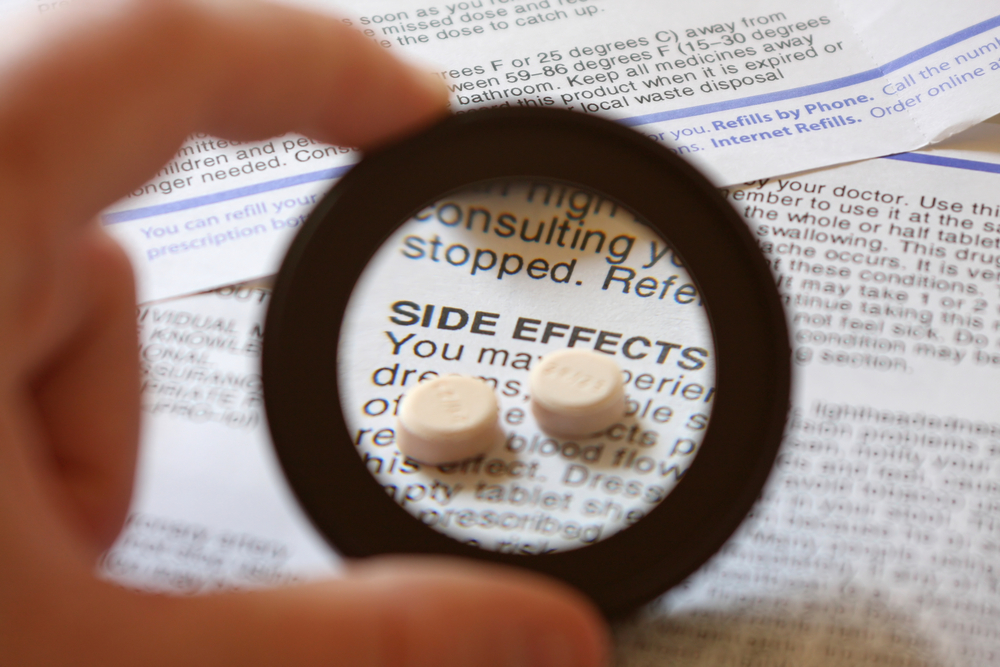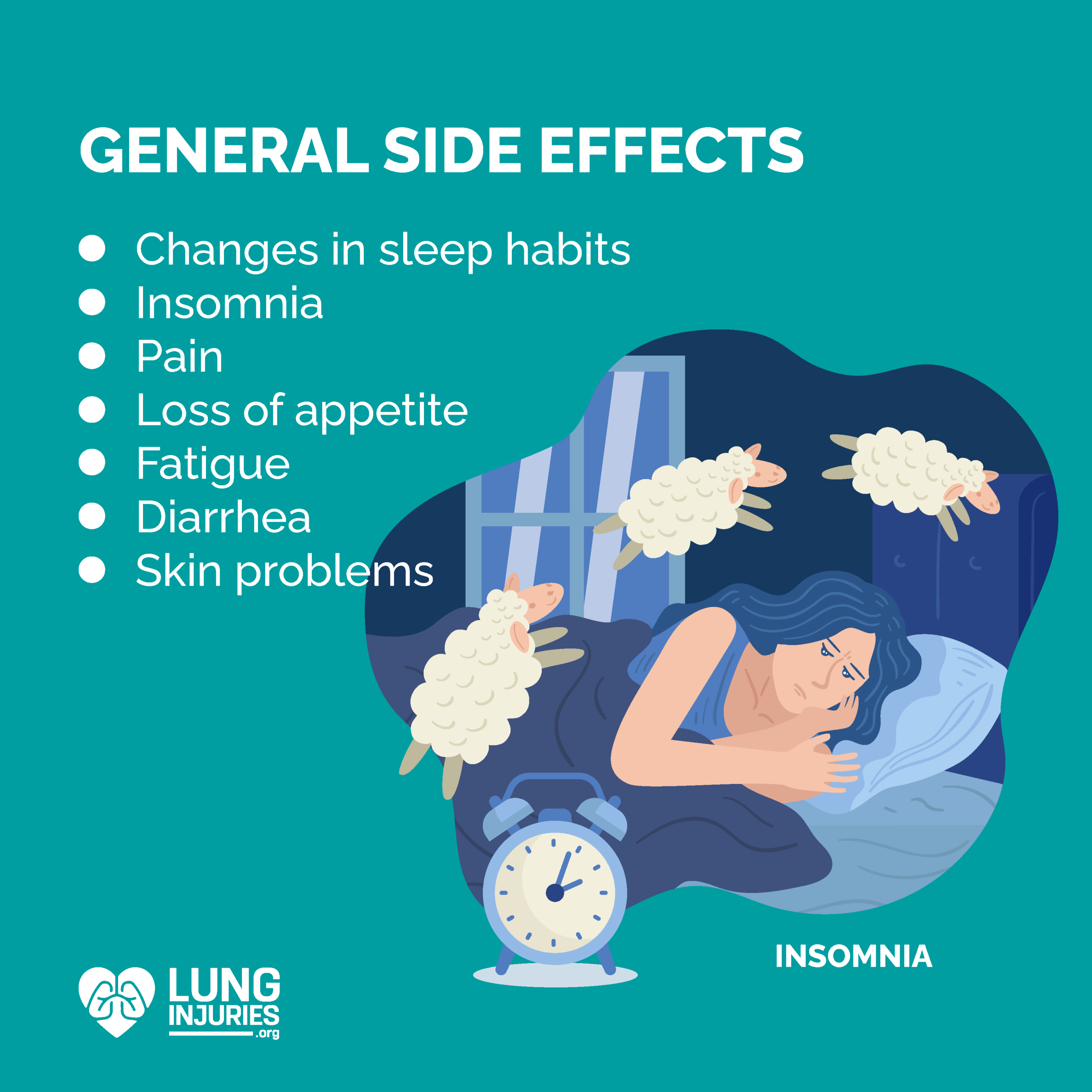Managing Treatment Side Effects

When we seek treatment for a medical condition, our goal is to improve our health and manage our symptoms. Unfortunately, sometimes the treatment itself brings it own symptoms, or treatment side effects. Some side effects are relatively minor and may not cause much disruption in your life. Others, however, can be extremely disruptive.
Everyone experiences symptoms and side effects differently. It is important to understand the cause of lung injury symptoms and how to manage them so you have a better quality of life. Below, we discuss some of the more common side effects that lung injury patients experience.
General Side Effects to be Aware Of
Some people experience more generalized side effects from cancer treatment, regardless of which treatment or combination they are receiving. Some of the most common general side effects reported include:

If you notice any of these side effects, talk to your doctor. They could be the result of your treatment. Ultimately, managing treatment-related side effects will depend on your overall health, the underlying cause and possible alternative treatment options.
Treatment-Related Side Effects
Some lung injury treatment options carry the risk of side effects. Some are well documented, and others occur relatively rarely. In either case, it is important to be aware of the possible side effects of treatment and know how to manage your symptoms.
Chemotherapy
Chemotherapy damages or kills cancer cells, and is one of the most common and effective treatments for individuals with lung cancer. Unfortunately, chemo can also damage healthy cells, such as hair follicle cells, as well as cells lining the mouth and gastrointestinal tract. Damage to these healthy cells can cause side effects like nausea and vomiting, hair loss, sore mouth, and constipation.
Fortunately, many of the newer chemo drugs do not have as high of a risk of side effects as older drugs. Also, because doctors understand the common risks and side effects, they are better able to help patients manage their symptoms. For chemo, managing side effects includes:
- Taking anti-nausea medication during chemotherapy treatment
- Drinking plenty of clear liquids to avoid dehydration
- Taking stool softeners to help avoid or ease constipation
- Using certain mouth care rinses to help ease a sore mouth or gums
- Using pain medication when necessary
As for hair loss, everyone manages this side effect differently. Generally, hair loss occurs during chemotherapy, but then your hair grows back after treatment is complete. Of course, it can be very difficult to manage this aspect of cancer treatment. Many people use scarves, wigs or hats to accessorize and detract from their hair loss. Others embrace the change and even make short hair or baldness permanent.
Radiation
Not everyone who receives radiation therapy will experience side effects. Those who do may experience them during or shortly after treatment, or they may not appear until weeks or months after treatment has ended. Side effects of radiation are broken down into two categories:
- Early Side Effects: Early side effects, or those that occur during or shortly after treatment, are generally mild and resolve within a few days to a few weeks. These side effects include fatigue, skin changes, and hair loss in the treatment area.
- Late Side Effects: Late side effects develop in the days, months or even years after treatment. They can develop in any area of the body where normal tissue was exposed to radiation. The most common symptoms include dry or flaky skin, neuropathy (loss of sensation), thyroid problems and damage to nearby bones.
How you manage these side effects will depend on your course of treatment and other factors. There are radioprotective drugs that can help reduce the risk of side effects. These drugs can only be used for radiation on certain areas of the body, however. Also, there is the possibility that the drugs also have side effects. It is important to weigh the risks and rewards when using this type of drug.
Surgery
If treating your lung injury involves surgery, it is important to understand the possible side effects of the surgery you are having and how to manage them. Surgery always has the risk of complications or side effects. Sometimes those risks are immediate, and other times they develop after a few days or weeks.
Most side effects from surgery will resolve over time. Unfortunately, they can be difficult to manage while they are active. The most common side effects from surgery include:
- Sore throat
- Pain
- Nausea and vomiting
- Difficulty urinating
- Wound infection
- Nerve pain or damage
- Adverse reaction to the anesthetic
- Gastrointestinal problems (constipation, etc.)
Some of these side effects are more common than others. For example, a sore throat and pain are both extremely common right after surgery due to the procedure itself. Other side effects, like wound infection or nerve damage, are less common.
The good news is that pain, nausea, sore throat, constipation, etc. can easily be managed as you heal. Prescription or over-the-counter (OTC) medications can help relieve pain and settle your stomach. It is important to get plenty of rest and stay hydrated as you heal. You can manage pain and scarring by treating your incisions carefully, keeping them clean and dry and watching out for signs of infection.
Targeted Therapy
Side effects related to targeted therapy are generally mild and usually will resolve once your body has adjusted to the medication. Your doctor will monitor your dose and side effects and may adjust how much of the medication you receive, or may take a break from treatment for a short period of time.
The most common side effects of targeted therapy include:
- Skin problems
- High blood pressure
- Poor wound healing
- Blood clots
- Bleeding
Most of these symptoms are mild and are easily managed by adjusting the dose of targeted therapy drugs. Your doctor will carefully monitor your symptoms, and it is important that you follow up with him or her about any changes, worsening or improvement. There are rare cases of side effects developing in the months or years after treatment, but this does not happen often.
Immunotherapy
Similar to targeted therapy, the side effects of immunotherapy are generally mild. They tend to go away after your body adjusts to the medication. Of course, you may experience some discomfort while your body adjusts. If your symptoms are too severe, your doctor may recommend adjusting the dose or taking a break from therapy so you can heal.
The most common side effects associated with immunotherapy include:
- Flu-like symptoms
- Fatigue
- Skin reactions
These side effects can be easily managed by adjusting the dose of medication and utilizing basic treatment options like OTC pain medication. Mild skin reactions can be treated with OTC moisturizers or anti-itch creams. If they are severe, a prescription cream may be recommended.
Certain immunotherapy drugs also have a risk of causing birth defects. If you are pregnant or are planning to become pregnant, talk to your healthcare team about this risk and your best options for treatment.
Reporting Side Effects
One of the most important steps in managing side effects of treatment is reporting any side effects or changes in your symptoms to your doctor. The goal of treatment is to ease your symptoms and treat your lung injury. If you experience side effects, you may question your treatment decision and options.
Before deciding that you chose the wrong treatment or that you are unhappy with your treatment, talk to your healthcare team. Find out if there are ways to manage your symptoms, or if there are alternative treatment options that have less risk of complications or side effects.
Sources:
- https://www.cancer.ca/en/cancer-information/diagnosis-and-treatment/managing-side-effects/?region=on
- https://www.cancer.ca/en/cancer-information/diagnosis-and-treatment/chemotherapy-and-other-drug-therapies/chemotherapy/side-effects-of-chemotherapy/?region=on
- https://www.cancer.org/treatment/treatments-and-side-effects/physical-side-effects.html
- https://www.cancer.org/treatment/treatments-and-side-effects/treatment-types/radiation/effects-on-different-parts-of-body.html
- https://www.cancer.ca/en/cancer-information/diagnosis-and-treatment/surgery/?region=on
- https://www.cancer.ca/en/cancer-information/diagnosis-and-treatment/chemotherapy-and-other-drug-therapies/targeted-therapy/?region=on
- https://www.cancer.ca/en/cancer-information/diagnosis-and-treatment/chemotherapy-and-other-drug-therapies/immunotherapy/?region=on